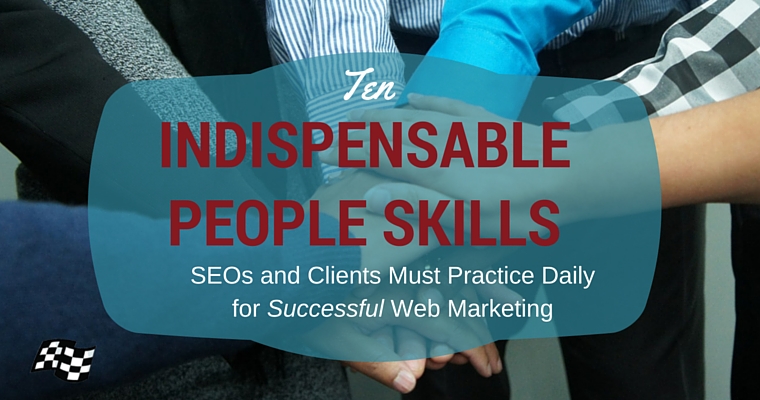Those of us setting out to learn something new about web marketing are often looking for how-to information on SEO research, social media implementation, the latest algorithm changes, and what the most successful web marketers are doing today that they weren’t doing yesterday.
To be sure, that information is important, but there is more to SEO than just strategy.
Successful web marketing isn’t all how-to-do, or even what-to-do. While that may be 80% of your efforts, it’s only 20% of one’s ability to be successful. SEO cannot succeed on one’s own knowledge and skills alone. While highly technical, the best SEOs are those that perform upon a foundation of collaboration. And the most successful businesses are those that make it a priority to collaborate heavily with their web marketers.
The ten to-do’s posed in this post are really basic people skills. That is, they can be applied to anybody, anytime, anywhere. Here, I have applied them to web marketing and, more specifically, to the SEO and clients working together on web marketing campaigns. The fact that these to-dos are not 100% SEO specific doesn’t make them any less important. What is important is taking these people skills and applying them to the areas of your life that matter.
Successful web marketing cannot be done by the web marketer alone, but in conjunction with a willing client. It’s a team effort and together, if both are doing the right things, they will find their web marketing efforts are exponentially more successful.
1) Listen to Others, Don’t Just Make Them Listen to You
SEO: The role of SEO often entails telling the client what needs to be done. But before an SEO can even begin, there is a good amount of “listening” that needs to happen. Before we start a web marketing campaign, we ask our clients a series of questions to help us get a better understanding of the client’s needs, wants, and desires. Until we have this information, there is no way we can proceed in the client’s best interest.
Client: Many clients have an idea of what they want, and they then expect the SEO to work in lockstep. But that’s not always the best way to success. Clients need to take some time to listen to an SEO’s plan and then ask the questions necessary to help them understand it. Dictating the course of the web marketing campaign will only tie the SEO’s hands and, ultimately, keep them from doing what truly needs to be done.
2) Ask the Right Questions
SEO: It’s not enough just to ask questions. The SEO needs to ask the right questions. While a large part of SEO is technical, a good portion of it is implementing the technical in a personal way. To do that, the SEO needs to have a good understanding of the business audience, values, hot points, and objections. They need to ask the questions that better help them understand what is important to the client and why—including why certain decisions were made in the past.
Client: Having the right expectations is a huge part of being successful. Not that expectations will change the facts on the ground, but when a client assumes things will go a certain way and they don’t, that often colors their perceptions. If there is anything you don’t understand about the process, a particular strategy or when to expect certain results, be sure you’re asking these questions well in advance.
3) Accept Thoughts and Ideas That are Not Your Own
 SEO: The web marketer is the one with the knowledge and skill to get the job done. But no matter how many years they have under their belt, their solution isn’t always the best one for any particular site. Give me two sites built on the same platform in the same industry and I’ll show you a hundred differences between them that impact their marketing campaigns. For the most part, the SEO should have a clear picture of what needs to be done, but they need to adapt to the client’s unique circumstances.
SEO: The web marketer is the one with the knowledge and skill to get the job done. But no matter how many years they have under their belt, their solution isn’t always the best one for any particular site. Give me two sites built on the same platform in the same industry and I’ll show you a hundred differences between them that impact their marketing campaigns. For the most part, the SEO should have a clear picture of what needs to be done, but they need to adapt to the client’s unique circumstances.
Client: Don’t be so married to your site that you’re unwilling to accept some tough love from your web marketing team. I don’t care how much your site cost you or how “successful” you’ve been so far, your SEO is tasked with helping you overcome your challenges. Be willing to implement some out-of-the-box thoughts and ideas. Everything is worth testing. The SEO may end up be wrong about a thing or two, but let a real-world test it.
4) Allow New Information to Influence Your Opinion
SEO: The SEO never has all the information they need. No matter how many questions they ask, there will always be something unearthed while dealing with the client. This new information can and should influence any opinions or plans the SEO has. That’s not to say everything has to derail, but the SEO should be able to make course corrections as needed.
Client: If there is one constant in SEO, it’s is that things change. Decisions that were firm a month ago may need to be revisited based on new information today. Be willing to accept new information and allow that information to challenge your previously held thoughts and opinions. It’s the job of the SEO to keep you informed of anything relevant to your campaign. If you feel they keep making the same recommendations over and over again, seek understanding, and allow this new insight to guide your current ideas.
5) Think and Observe Before Making Knee-Jerk Reactions
 SEO: Many SEOs spend their time reacting to algorithm changes rather than having carefully considered their actions in the first place. Most algorithm updates should have zero negative impact on an optimized website. Those impacted suffer from SEO decisions being made without looking at the long-term ramifications. Make sure every web marketing action you take considers what is best for the visitor before looking for what is best for the search engine.
SEO: Many SEOs spend their time reacting to algorithm changes rather than having carefully considered their actions in the first place. Most algorithm updates should have zero negative impact on an optimized website. Those impacted suffer from SEO decisions being made without looking at the long-term ramifications. Make sure every web marketing action you take considers what is best for the visitor before looking for what is best for the search engine.
Client: If the site does suffer negative consequences from an algorithm update or something else, take a breath before reacting. Some things are temporary as the algorithm changes filter through all data centers. You need to see things settle down before jumping into action. Don’t force your SEO to make changes based on limited data. Doing so will only harm your long-term results.
6) Be Willing to Do Things Different
SEO: Because every website has its own unique challenges, sometimes a new approach is necessary. This new approach might be a compromise between what you want and what the client wants, or it might be something entirely out-of-the-box. Either way, sometimes something new is needed to get the client out of a rut.
Client: Some things the SEO recommends may make you uncomfortable, whether it’s an idea for social media, content they suggest creating, or doing something you simply have never seen done before. Before shooting it down, allow yourself to consider the idea along with the pros and cons. If the downside is minimal then it just might be an idea worth doing.
7) Be Willing to Have Your Ignorance Exposed
 SEO: SEOs often feel like they have to know everything at all times, especially when it comes to the latest in the world of search. But it’s okay to simply say, “I don’t know”. It’s better to admit you don’t have an answer and then find it than to provide the wrong answer out of pride. I’d rather work with someone who can find the answers than one who pretends to know it all.
SEO: SEOs often feel like they have to know everything at all times, especially when it comes to the latest in the world of search. But it’s okay to simply say, “I don’t know”. It’s better to admit you don’t have an answer and then find it than to provide the wrong answer out of pride. I’d rather work with someone who can find the answers than one who pretends to know it all.
Client: Every now and then, a client will know enough to be dangerous. They usually have a superficial knowledge of web marketing based on something they read. Regardless of how much time you spend keeping up on SEO, you need to realize you likely don’t know as much as the SEO you are paying. Don’t be the guy who thinks he has all the answers.
8) Be Willing to Listen to Hard Truths Without Getting Defensive
SEO: This is a tough one for many SEOs as we often understand the “reasons” why any campaign may not be going as planned. An SEO can try to explain everything away, or you can listen for the nuggets of truth. The latter is harder than the former, but ultimately, if you are willing, it will help you refocus efforts and make the campaign more effective.
Client: The same goes for the client. When criticizing the progress of a web marketing campaign the SEO may have some hard truths for you as well. If you are not willing to listen, you’re likely to repeat the same mistakes time and time again.
9) Be Willing to Accept Directions
 SEO: It’s not too uncommon for the plan an SEO lays out early in the campaign to shift. This might come from a change in focus for the client or perhaps new data that tells you what you’re doing now isn’t working. Either way, the client may jump in and suggest a new or change in strategy. Be willing to explain your plan, but also be willing to allow the campaign to go in the direction the client wants.
SEO: It’s not too uncommon for the plan an SEO lays out early in the campaign to shift. This might come from a change in focus for the client or perhaps new data that tells you what you’re doing now isn’t working. Either way, the client may jump in and suggest a new or change in strategy. Be willing to explain your plan, but also be willing to allow the campaign to go in the direction the client wants.
Client: Every web marketing campaign comes down to time and budget. If you’re not getting the results you expect, it may be because the SEO is limited by either of these two factors. As you seek to make your campaign more aggressive, you may be told that the best way forward is to increase your budget. It may be time to give your campaign a kick in the pants.
10) Be Willing to Admit When You’re Wrong
SEO: Yup, sometimes we get things wrong. We think if we do one thing, we’ll get a certain result, but the opposite happens. Some mistakes may even be costly to the client. The best thing you can do is to own up to your mistakes and quickly find a way to correct them. The next step is to put in systems that will ensure the same mistake doesn’t happen again.
Client: Sometimes SEOs get the blame for a result caused by a client decision or something entirely out of their control. Web marketing cannot account for everything. If a bad decision impacts your web marketing, be willing to see it for what it is rather than to look for an SEO to blame. This will allow you both to work together to find a solution that will repair the problem and get you back on track.
Good Web Marketing is a Team Effort

SEO is more than technical strategies and implementation. It’s about wisdom and the ability to make sound decisions. Good web marketing truly is a team effort where both the client and the SEO share a role in the overall success of the campaign.
While the 10 to-do’s above don’t address any technical issues, they do address the people behind the campaign. If both sides can satisfactorily come to terms with these must do’s, they are more likely to be able to work as a team that will make the marketing campaign a resounding success.
What people skills do you think are vital to a healthy SEO/client relationship and successful web marketing campaigns?
Image Credits
Featured Image: Image by Stoney deGeyter
In-post Photo #1: geralt/Pixabay.com
In-post Photo #2: AndyPandy/Pixabay.com
In-post Photo #3: geralt/Pixabay.com
In-post Photo #4: niekverlaan/Pixabay.com
In-post Photo #5: skeeze/Pixabay.com





![AI Overviews: We Reverse-Engineered Them So You Don't Have To [+ What You Need To Do Next]](https://www.searchenginejournal.com/wp-content/uploads/2025/04/sidebar1x-455.png)